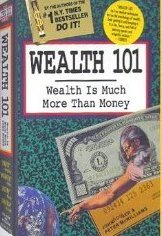 WEALTH 101
WEALTH 101
Getting What you Want-Enjoying what You've Got
Welcome to WEALTH 101. This is not your typical book about money. First, I'm going
to suggest that you really don't need any more; that you can live your life fully
and joyfully with what you already have; that after basic biological needs are met,
enjoying life has very little to do with money; and that if you entirely let go of
the pursuit of money for its own sake, you'll probably be a lot better off.
Then I'll tell you how to get more money. Wealth is enjoying what we already have,
not getting more of what we think will make us happy. We are wealthy when we have
learned to live with ourselves, knowing that what we are and have is enough.
When we know it's our appreciation of what we have-not what we have (not)-that brings
enjoyment, it's easier to choose what we really want. When we pursue what we really
want, we stand a better chance of not only getting it, but enjoying the pursuits.
"Before I had a lot of money, I was really quite happy," said Oprah Winfrey. "And
I will tell you this-then you may not believe it-I never would have gotten money
if I wasn't happy to begin with. I never would have gotten it."
In other words-enjoy what you've got to get what you want.
Not that I am against money, you understand. I like money. In fact, I love money.
Money is a powerful symbol of energy, and energy is a great thing. As such, money
is a tool. It can be misused-and it can be splendidly used, too. Money doesn't care.
There are specific techniques for getting more money. I'll tell you what I know.
There are also techniques for getting other forms of energy-some more valuable than
mere money. I'll suggest a good many of those techniques, too. And then we'll come
full circle and discuss enjoying the fruits of your harvest.
For some, that enjoyment is felt as jubilation, happiness, ecstacy. For others it's
contentment, fulfillment, a quiet sense of satisfaction for a job well done. However
you experience enjoyment-delight, serenity, or any combination-I like to think you'll
find something in these pages to embrace that.
Then we come to the shortest-but perhaps the most crucial-section of the book, "Balance."
Some people are too busy "earning a living" to live. My advice to them? Slow down.
At the very least, follow Bernard Baruch's suggestion: "Always do one less thing
than you think you can do." Or, if I were in a more caustic mood, I might quote George
Bernard Shaw: "To be clever enough to get a great deal of money, one must be stupid
enough to want it."
Other people are too poor to enjoy life. To these people I'd probably say, "Speed
up!" Get going. Get enough wealth flowing through your life to enjoy your dream.
And don't wait. Do it now. As Zero Mostel pointed out in Mel Brook's The Producers,
"He who hesitates is poor."
So, should you slow down, or speed up? There are no "right" answers. Balance is a
highly personal thing-dynamic, and requiring great skill, like crossing a tightrope,
with a heavy wind, during an earthquake. The balance point always seems to be moving,
shifting, and appears as elusive as love.
But, like love, when found, the balance point can be just as rewarding.
So, welcome to wealth. Enjoy.


 WEALTH 101
WEALTH 101